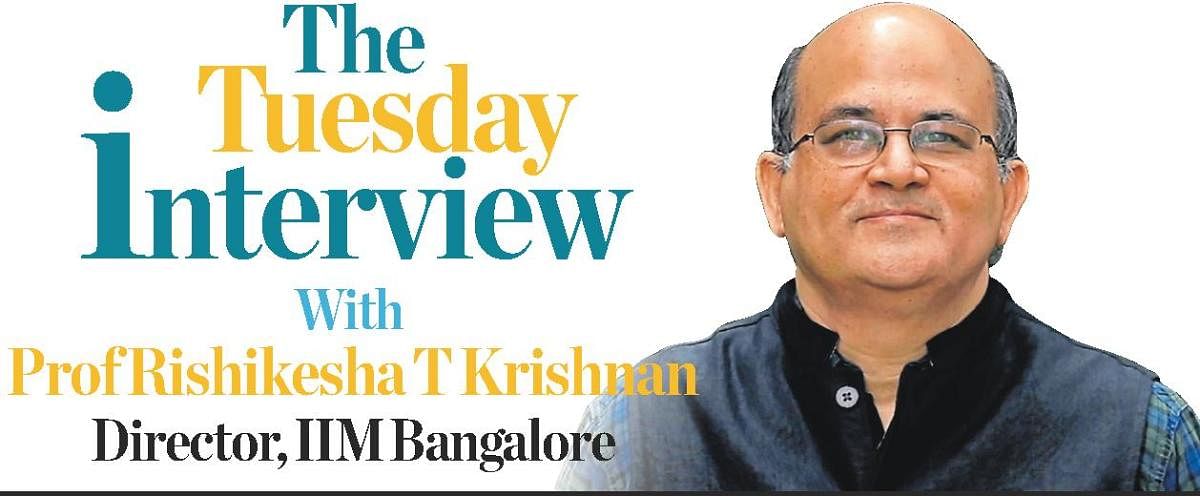
From Sundar Pichai to Satya Nadella, Indian-origin CEOs lead some of the biggest companies in the world. India is also home to the founders of some of the world’s most unique startups. In a wide-ranging interview with DH’s Dhanya Skariachan, Professor Rishikesha T Krishnan, Director, IIM Bangalore, spoke about how it was fostering entrepreneurship, the evolution of management education, the role of digital learning and why research has emerged as a key focus area at the institute.
How has management education evolved in India?
Over the last 60 years, management education in India has evolved well, in tune with the needs of the times. Today Indian management institutions like IIM-B are ranked among the top management institutions in the world. At IIM-B, we seek to combine rigour and relevance – we address management problems relevant to India and the region and our research on these problems is published in the most demanding academic journals. We cover critical issues related to industry such as sustainable supply chains and digital and social marketing as well as broader societal issues such as universal healthcare and communication in the context of climate change.
What is the role of digital learning in institutions of higher education?
Digital learning plays a role on multiple fronts – it enables us to reach out to a larger global audience (our 50+ courses on the edX platform reach learners in 190+ countries); meet the needs of under-managed sectors (our new online certificate programme for hospital management will be launched shortly) and provide more complete and integrated learning experiences (in executive education, we increasingly blend asynchronous online foundation courses with socratic learning in the classroom).
What is the role of institutions like the IIMs in the national context?
IIMs play multiple roles. We are an important source of new ideas for the government and industry. For example, an IIM-B study has led to the waiver of stamp duty on low-cost housing to provide a fillip to the sector. We often play the role of neutral and unbiased experts on policy and even in legal matters. We create the managers who lead some of the most important business enterprises. Increasingly, we are making significant contributions to the entrepreneurial pool who are building the businesses of tomorrow.
Research has emerged as a key focus area at IIM-B. Tell us why.
Accounting to almost a sixth of humankind, and increasingly a key player in the global economy, India is an important arena for business and social innovation. It has influenced the world through developments such as the growth of the IT and software industries and the development of low-cost yet high-quality drugs and healthcare solutions. India is a pioneer in creating public open platforms like the India Stack for financial inclusion riding on innovations such as Aadhaar and UPI. We are at the heart of these changes and have a unique opportunity to study these. Besides such context-driven research, we have the capability to address some of the most challenging conceptual problems across management-related disciplines. A strong PhD programme not only enables us to have access to the young, highly talented minds who can focus on research, but also contributes to the country’s need for high-quality faculty. High-quality research requires myriad methods and perspectives. Research collaborations help us complement our skills and capabilities. Across the world and across disciplines, collaboration is one of the key drivers of research productivity and quality.
Why is it important for management institute faculty to publish in top-tier journals?
The best scholars in any field publish in the top-tier journals of that field. The top-tier journals often represent the frontiers of scholarship, and articles in these journals are widely cited across the field. To be a Vishwaguru, at least as far as reaching other academics is concerned, publication in top journals is important. It helps scholars across the world know about India-based research. For example, research by Prof Mukta Kulkarni of IIM-B in Human Resource Management demonstrates how overlooked and under-utilised people with disabilities are.
What is IIM-B doing to foster innovation, entrepreneurship and agile learning?
Started a little over 20 years ago, IIM-B’s NS Raghavan Centre for Entrepreneurial Learning is today one of the leading academic incubators and hubs of entrepreneurship. Since inception, 1,15,600+ entrepreneurs have been engaged through various programs, workshops, masterclasses and events; 855+ start-ups have been through the 12-month focused incubation and investor connect; 585+ start-ups were part of the 3-month Launchpad for workshops to build their business model canvas, develop strategy to get initial traction. We estimate that 6,900+ direct jobs have been created by entrepreneurs after participating in NSRCEL programmes. IIM-B’s 2-year MBA programme is one of the few in the country to offer The Entrepreneurial Mindset as a core course.
How is IIM-B working towards being more inclusive?
IIM-B has been a leader in diversity and inclusion in it academic programmes. We provide structured support for students with disability through our dedicated Office of Disability Services. The aim is to provide students with disabilities with the best possible learning experience during their stay at IIM-B. All our students and faculty undergo sensitization programmes to enhance inclusion. Our current focus is on having more diversity in our faculty body through special recruitment drives.